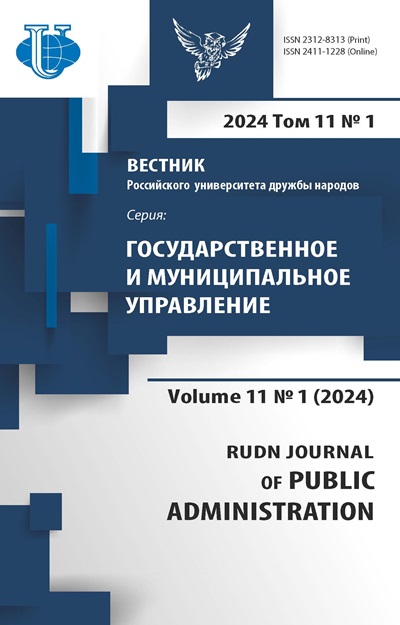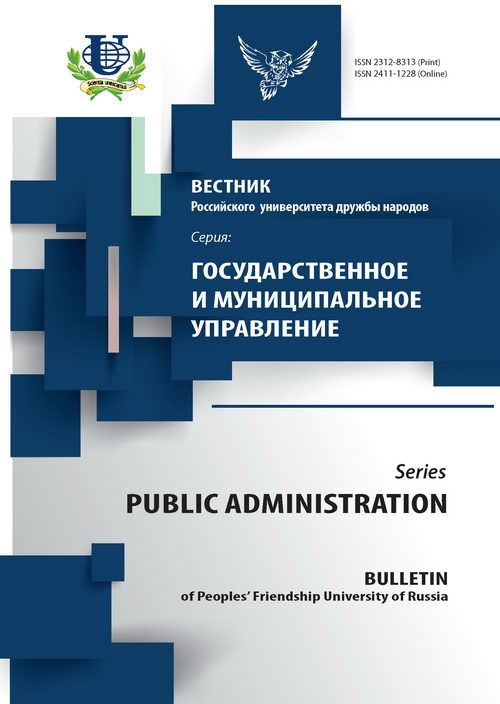ИННОВАЦИИ, РАСПРОСТРАНЕНИЕ ПОЛИТИКИ И ПРИНЯТИЕ РЕШЕНИЙ В ГЛОБАЛЬНОМ КОНТЕКСТЕ: ЧТО РОССИЯ МОЖЕТ ПЕРЕНЯТЬ ИЗ ОПЫТА СОЕДИНЕННЫХ ШТАТОВ АМЕРИКИ
- Авторы: Шультц Д.1
-
Учреждения:
- Университет Хэмлин
- Выпуск: № 3 (2015)
- Страницы: 54-64
- Раздел: Статьи
- URL: https://journals.rudn.ru/public-administration/article/view/6557
Цитировать
Полный текст
Аннотация
В настоящее время правительства и чиновники сталкиваются с более высокими требованиями к инновациям. Но часто реформы и направления политики формируются в условиях ограниченного знания. Такая ограниченная рациональность может способствовать развитию инновационной политики, но вместо названного подхода во многих случаях государственные чиновники стремятся освоить другие области компетенции для формулирования проводимой ими политики. В данном исследовании рассматриваются вопросы, касающиеся того, как правительство изучает, создает инновации и принимает решения. Используя США в качестве примера, в данной статье сделаны выводы о том, что: 1) часто существует значительный разрыв между социальной наукой и научным знанием и информацией, которую правительство использует при принятии государственных решений; 2) во многих случаях государственные должностные лица не имеют возможности использовать и анализировать соответствующую информацию при проведении государственной политики; 3) правительство принимает решения в условиях ограниченной рациональности, зачастую осуществляет меньше инноваций и чаще использует «готовые решения» при осуществлении политики. В статье обобщен опыт Соединенных Штатов Америки, чтобы указать на последствия для других государств при формулировании собственной политики с учетом обмена опытом в условиях глобальной политико-экономической системы.
Об авторах
Дэвид Шультц
Университет Хэмлин
Email: dschultz@hamline.edu
Департамент политических наук
Список литературы
- Bachrach Peter, Baratz Morton. 1962. "Two Faces of Power". American Political Science Review (December). P. 947-952.
- Balla Steven J. 2001. “Interstate Professional Associations and the Diffusion of Policy Innovations.” American Politics Research. Vol. 29. No. 3. P. 221-245.
- Baumgartner Frank R., Leech Beth L. 1998. Basic Interests: The Importance of Groups in Politics and in Political Science. Princeton: Princeton University Press.
- Berry F.S., Berry W.D. 1990. “State Lottery Adoptions as Policy Innovations: An Event History Analysis.” American Political Science Review, 84 (2). P. 395-415.
- Blyth Mark. 2013. Austernity: The History of a Danger Idea. New York: Oxford University Press.
- Cao Xun. 2010. “Networks as Channels of Policy Diffusion: Explaining Worldwide Changes in Capital Taxation, 1998-2006,” International Studies Quarterly. V. 54. P. 823-854.
- Capanoa Giliberto. 2009. Understanding Policy Change as an Epistemological and Theoretical Problem, Journal of Comparative Policy Analysis: Research and Practice, 11:1. P. 7-31.
- Capanoa Giliberto, Howlettb Michael. 2005. “ Introduction: The Determinants of Policy Change: Advancing the Debate, Journal of Comparative Policy Analysis, 7:4: 1-5.
- Cervantes Mario, Malkin Daniel. No date. “Russia’s Innovation Gap.” OECD. URL: http://www.oecdobserver.org/news/archivestory.php/aid/554/Russia_92s_innovation_gap.html#sthash.WjuusI5o.dpuf.
- Coase Ronald. 1937. "The Nature of the Firm", Economica 4 (16): 386-405,. Washington, D.C.: Council of State Planning Agencies.
- Cobb Roger W., Elder Charles D. 1972. Participation in American Politics; The Dynamics of Agenda Building. Boston: Allyn and Bacon.
- Dahl Robert A. 1989. Democracy and Its Critics. New Haven: Yale University Press.
- Dahl Robert A. 1979. Who Governs? Democracy and Power in an American City. New Haven: Yale University Press.
- Dahl Robert A. 1971. Polyarchy: Participation and Opposition. New Haven: Yale University Press.
- Dahl Robert A. 1976. Democracy in the United States: Promise and Performance. New Haven: Yale University Press.
- Dobbin Frank, Simmons Beth, Garrett Geoffrey. 2007. “The Global Diffusion of Public Policies: Social Construction, Coercion, Competition, or Learning,?” Annual Review of Sociology. V. 33. P. 449-472.
- Filatova Olga, Schultz David. 2015. "Health Care Reform in Russia and the United States." Unpublished manuscript in possession of the authors.
- Füglister Katharina. 2012. “Where does learning take place? The role of intergovernmental cooperation in policy diffusion,” European Journal of Political Research. V. 51. P. 316-349.
- Gilardi Fabrizio. 2010. “Who Learns from What in Policy Diffusion Processes,? American Journal of Political Science. V. 54. P. 650-666.
- Gokhberg Leonid, Kitova Galina, Roud Vitaliy. 2014. “Tax Incentives for R&D and Innovation: Demand versus Effects,” Foresight-Russia, 8:3. P. 18-41.
- Dmitry, Shirikov Anton. 2013. "Public Administration in Russia." In Liebert, Saltanat, Stephen E. Condrey, and Dmitry Goncharov, eds Public Administration in Post Community Countries. New York: CRC Press. P. 23-42.
- Graham Erin R., Charles R. Shipan and Craig Volden. 2012. “Review Article: The Diffusion of Policy Diffusion Research in Political Science, “British Journal of Political Science. V. 43. P. 673-701.
- Gray Virginia. 1994. “Competition, Emulation, and Policy Innovation.” In L.C. Dodd and C. Jillson (eds.) New Perspectives on American Politics. Washington, D.C.: CQ Press. P. 230-248.
- Gray Virginia. 1973. “Innovation in the States: A Diffusion Study. American Political Science Review. Vol. 67. No 4. P. 1174-1185.
- Hall Jeremy L. 2007. “Informing State Economic Development Policy in the New Economy: A Theoretical Foundation and Empirical Examination of State Innovation in the United States.” Public Administration Review. (July-August). P. 630-645.
- Hume David. 1980. A Treatise of Human Nature. New York: Oxford University Press.
- Jones Charles O. 1977. An Introduction to the Study of Public Policy. North Scituate, MA: Duxbury Press.
- Key V.O. 1967. Politics, Parties, & Pressure Groups. New York: Thomas Y. Crowell Company.
- Kingdon John W. 1995. Agendas, Alternatives, and Public Policies. HarperCollins.
- Kızılkaya Emre. 2014. “As Sanctions Hit Harder, Russia Cautiously Opens up to Innovation,” Daily News. URL: http://www.hurriyetdailynews.com/as-sanctions-hit-harderrussia-cautiously-opens-up-to-innovation-.aspx?PageID=238&NID=75809&NewsCatID=344.
- Liebert Saltanat, Stephen E. Condrey, and Dmitry Goncharov. 2013. Public Administration in Post Community Countries. New York: CRC Press.
- Lindblom Charles E. 1959. "The Science of Muddling Through." Public Administration Review. 19:2. P. 79-88.
- Lindblom Charles E. and Edward J. Woodhouse. 1992. The Police Making Process. New York: Prentice Hall. Columbus, OH: McGraw-Hill.
- Lindblom Charles E. and David Cohen. 1979. Usable Knowledge: Social Science and Social Problem Solving. New Haven, CT: Yale University Press.
- Lowi Theodore J. 1969. The End of Liberalism. New York: W.W. Norton & Company, Inc.
- Marmor Theodore R., Richard Freeman and Kieke G.H. Okma. 2009. Comparative Studies and the Politics of Modern Medical Care. New Haven: Yale University Press.
- McConnell Grant. 1966. Private Power and American Democracy. New York: Alfred A. Knopf.
- Mintrom Michael. 1997. “Policy Entrepreneurs and the Diffusion of Innovation.” American Journal of Political Science. Vol. 41. No. 3. P. 738-770.
- Moynihan Daniel Patrick.1969. Maximum Feasible Misunderstanding: Community Action in the War on Poverty. NY: The Free Press.
- Plant Raymond. 2009. The Neo-Liberal State. NY: Oxford University Press.
- Pressman Jeffrey, and Aaron Wildavsky. 1973. Implementation. Berkeley, CA: University of California Press.
- Raynera Jeremy. 2009. Understanding Policy Change as a Historical Problem, Journal of Comparative Policy Analysis: Research and Practice, 11:1. P. 83-96.
- Rein Martin. 1976. Social Science and Public Policy. NY: Penguin Books.
- Rivlin Alice. 1971. Systematic Thinking for Social Action. Washington, D.C.: Brookings Institution.
- Schattschneider E.E. 1960. The Semi-Sovereign People: A Realist’s View of Democracy in America. New York: Holt, Rinehart and Winston.
- Schultz David. 2013. American Politics in the Age of Ignorance: Why Lawmakers Choose Belief Over Research. New York: Palgrave-Macmillan.
- Schultz David. 2011. “The Crisis of Public Administration Theory in a Post-global World,” in Don Menzel and Harvey White, eds. The State of Public Administration: Issues, Challenges, Opportunities. Armonk, NY: M.E. Sharpe.
- Shipman Charles R., and Craig Volden. 2006. “Bottom-Up Federalism: The Diffusion of Antismoking Policies from U.S. Cities to States. American Journal of Political Science. Vol. 50. No. 4. P. 825-843.
- Simon Herbert. 1997. Administrative Behavior. New York: Free Press.
- Stone Deborah. 2002. Policy Paradox: The Art of Political Decision Making. New York: W.W. Norton & Company.
- Sugiyama Natasha Borges. 2008.“ Ideology and Networks: The Politics of Social Policy Diffusion in Brazil,” Latin American Research Review. V. 43. P. 82-108.
- Teodoro Manuel P. 2007. “Bureaucratic Career Mobility and Policy Innovation.” Unpublished paper prepared for presentation at the Gerald R. Ford Fellows’ Reunion Conference, Ann Arbor, Michigan, (May 12).
- Truman David B. 1971. The Governmental Process: Political Interests and Public Opinion. New York: Alfred A. Knopf.
- Tufte Edward. 1974. Data Analysis for Politics and Policy. Englewood Cliffs, NJ: Prentice-Hall, Inc.
- Walker Jack. 1969. “The Diffusion of Innovations Among the American States,” American Political Science Review. Vol. 63. No. 2. P. 880-899.
- Weimer David and Aidan Vining. 2010. Policy Analysis: Concepts and Analysis. New York: Pearson.
- Wilson Woodrow. 1887. “The Study of Administration.” Political Science Quarterly. (June). P. 2.
- Wolff, Martin. 2014. The Shifts and the Shocks: What We've Learned - and Have still to Learn - from the Financial Crisis. New York: Penguin Press.
- Wyckoff, Paul Gary. 2009. Policy & Evidence in a Partisan Age. Princeton: Princeton University Press.
- Ziegler, Harmon. 1964. Interest Groups in American Society. Englewood Cliffs, New Jersey: Prentice-Hall, Inc.
- Zohlnhöfera, Reimut. 2009. “How Politics Matter When Policies Change: Understanding Policy Change as a Political Problem,” Journal of Comparative Policy Analysis: Research and Practice, 11:1 97-115.
















